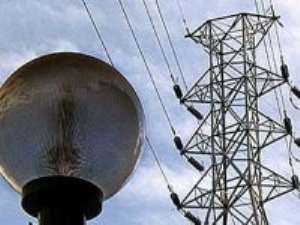
Electricity demand in Ghana had been reduced by 124 megawatts in 2008, translating into an annual cash savings of US $ 33 million to the economy as well as carbon savings of 105,000 tons per annum.
Professor Abeiku Brew-Hammond, Chairman of the Board of the Energy Commission, who made this known at a news conference in Accra yesterday, attributed the development to the introduction and mass adoption of the Compact Fluorescent Lamps (CFLs).
Recounting the major achievements since the establishment of the Commission in 1997 to July 2009, Prof. Hammond said the performance of public utilities engaged in the supply and distribution of electricity and natural gas has improved, following the enactment of eleven pieces of Legislation on Technical and Operational Rules and Standards.
He said as a result also of the enactment of three Regulations covering Fluorescent and Incandescent Filament Lamps, Household Refrigerating Appliances and Air conditioners, the Commission has been able achieve a certain level of energy efficiency.
In addition, Prof Hammond said, the Commission was able to produce in 2006, a Strategic National Energy Plan (SNEP) for the period 2006-2020.
Beyond these, Prof. Hammond said, the Commission has submitted a draft Renewable Energy Law to the Minster for Energy for onward submission to Cabinet and eventual passage by Parliament.
Furthermore, he said, the Commission has made progress in the establishment of a Ghana Renewable Energy Fund (GREEN fund) and launched a pilot project on Solar and Wind Grid-connected systems with a commitment of up to GHC 100,000 from the Energy Fund.
According to Prof. Hammond, the first set of eight (8) of the pilot projects are expected to be completed by the end of April.
He indicated that the National Grid Code to guide the operations of the Electricity Transmission Utility (ETU) has been completed and launched and a Natural Gas Transmission Utility Operator appointed.
For the rest of the year 2010 and beyond, Prof Hammond disclosed, the Commission has set itself twelve targets.
These, he said, include the passage of the Renewable Energy Law, completion of Grid-connected Solar and Wind pilot projects, establishment of the GREEN fund and the completion of Wood fuels and Bio fuels policy and legislative framework.
The others are start-up of the Refrigeration Appliances (Energy Efficiency) project, installation of capacitors to reduce electricity consumption in public facilities, completion of electricity market rules and the completion and passage of the National Electrical Wiring Regulations.
The rest are the completion of policy review for improvement in the power sector, completion of policy review for development of the natural gas sector, development and initiation of a new LPG promotion programme and the establishment of a National Energy Data Processing and information Centre.
The Energy Commission is the Government's energy policy advisor. The commission, as a regulator, also licenses public utilities for the transmission, wholesale supply, distribution and sale of electricity and natural gas.
The Commission prescribes by legislative instrument and enforces, in consultation with the Public Utilities Regulatory Commission, standards of performance and technical and operational rules of practice for the supply, distribution and sale of electricity and natural gas to consumers by public utilities.
As a planning institution, the Energy Commission prepares reviews and updates periodically indicative national plans to ensure that all reasonable demands for energy are met.
It also ensures the compilation of a comprehensive database for national decision making for the efficient development and utilisation of energy resources available to the nation.




 List of 24 ministerial nominees approved by Parliament
List of 24 ministerial nominees approved by Parliament
 You were my inspiration, made me who I am today – Lilian Kumah
You were my inspiration, made me who I am today – Lilian Kumah
 Rainstorm destroys Hohoe E.P. Senior High School building
Rainstorm destroys Hohoe E.P. Senior High School building
 John Kumah strongly supported me to become NPP flagbearer – Bawumia reveals
John Kumah strongly supported me to become NPP flagbearer – Bawumia reveals
 Late John Kumah urged me to run for NPP flagbearer, strongly supported me — Bawu...
Late John Kumah urged me to run for NPP flagbearer, strongly supported me — Bawu...
 Akufo-Addo appoints Joseph Kpemka as Deputy MD of BOST
Akufo-Addo appoints Joseph Kpemka as Deputy MD of BOST
 Ablakwa petitions CHRAJ to investigate sale of SSNIT's hotels to Rock City Hotel
Ablakwa petitions CHRAJ to investigate sale of SSNIT's hotels to Rock City Hotel
 MoF to provide new bailout for defunct Gold Coast Fund investors – Bawumia revea...
MoF to provide new bailout for defunct Gold Coast Fund investors – Bawumia revea...
 OMCs implement price adjustments despite International petroleum price declines
OMCs implement price adjustments despite International petroleum price declines
 Petition to remove Kissi Agyebeng will disrupt operations of OSP – Martin Kpebu
Petition to remove Kissi Agyebeng will disrupt operations of OSP – Martin Kpebu
